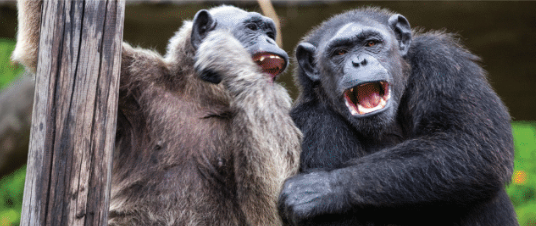The Rethinking of Man
Fifty years ago, a slender young Englishwoman was walking through a rainforest reserve at Gombe, in Tanzania, when she came across a dark figure hunched over a termite nest. A large male chimpanzee was foraging for food. She stopped and watched the animal through her binoculars as he carefully took a twig, bent it, stripped it of its leaves, and finally stuck it into the nest. Then, he began to spoon termites into his mouth. Thus, Jane Goodall made one of the most important scientific observations of modern times in that remote African rainforest. She witnessed a creature, other than a human, in the act not just of using a tool, but of making one. "It was hard for me to believe," she recalls. "At that time, it was thought that humans - and only humans - used and made tools. I had been told from school onwards that the best definition of a human being was, 'man the tool-maker', yet I had just watched a chimp tool-maker in action. I remember that day as vividly as if it was yesterday." Goodall telegraphed her boss, the fossil-hunter Louis Leakey, with the news. His response has since become the stuff of scientific legend: "Now we must redefine man, redefine tools, or accept chimpanzees as humans." Leakey was exaggerating, but not by much. Certainly, there is little doubt about the importance of Goodall's discovery five decades ago. As the distinguished Harvard palaeontologist Stephen Jay Gould put it, this was "one of the great achievements of 20th-century scholarship". Goodall's subsequent observations found that not only did Pan troglodytes , the chimpanzee, make and use tools, but that our nearest evolutionary cousins embraced, hugged, and kissed each other. They experienced adolescence , developed powerful mother-and-child bonds , and used political chicanery to get what they wanted. They also made war, wiping out members of their own species with almost genocidal brutality on one occasion observed by Goodall. This work has held up a mirror, albeit a blurred one, to our own species, suggesting that a great many of our behaviours, once thought to be uniquely human, may have been inherited from the common ancestors that Homo sapiens shared with chimpanzees six million years ago. (Reading text adapted from theguardian)

